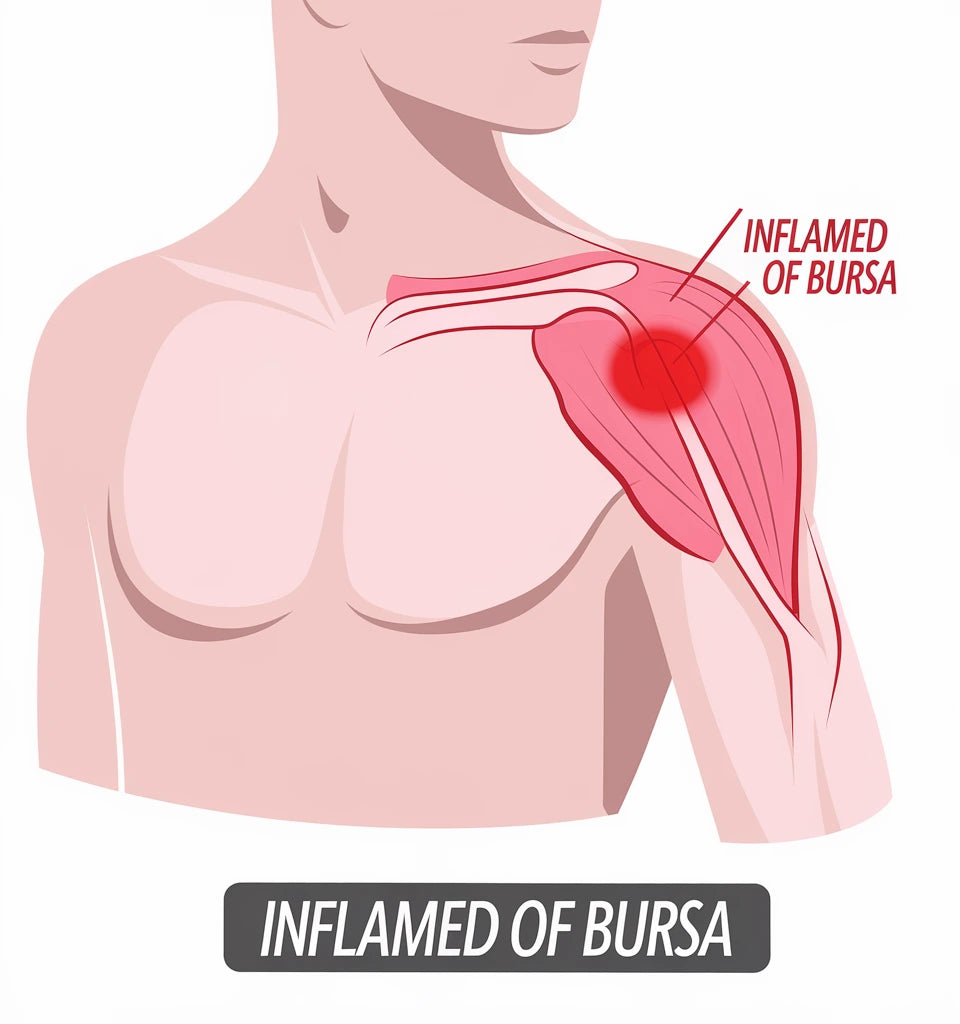Inflammation in the shoulder: Symptoms, causes, and treatment

Shoulder inflammation is a common problem that can cause pain and limited mobility. This article reviews the most common symptoms, causes, and treatment options for shoulder inflammation.
What is Inflammation in the Shoulder?
Shoulder inflammation means that the shoulder joint becomes swollen, red, and tender. The condition can be caused by overuse, injury, or infection. Treatment includes rest, anti-inflammatory medications, and physical therapy.
Inflammation can occur in various structures of the shoulder, including tendons, muscle attachments, bursitis of the shoulder , or in the shoulder joint itself. It can be both acute and long-term inflammation that affects the mobility and function of the shoulder. Frozen shoulder, or adhesive capsulitis, is a specific condition in which inflammation of the shoulder joint leads to severely reduced mobility.
Symptoms of shoulder inflammation
Several factors can contribute to inflammation in the shoulder:
- Overexertion or repetitive strain
- Trauma or fall to the shoulder
- Impingement of structures in the shoulder
- Age-related changes
- Monotonous movements for a long time
See also common causes and symptoms of shoulder injury for a broader understanding of strain-related injuries to the shoulder.
Causes of shoulder inflammation
Several factors can contribute to inflammation in the shoulder:
- Overexertion or repetitive strain
- Trauma or fall to the shoulder
- Impingement of structures in the shoulder
- Age-related changes
- Monotonous movements for a long time
Bursitis is a common cause of shoulder inflammation, especially in people who repeat the same movement for long periods of time. Impingement means that the soft tissues in the shoulder become pinched, causing irritation and inflammation. Overuse of the muscles around the shoulder can also lead to inflammation of the muscles and tendons, which often affects athletes or people with physically demanding jobs.
Diagnosis and treatment of shoulder inflammation
Shoulder inflammation can occur from overuse, repetitive motion, or injury to tendons and muscles. The condition often leads to pain, stiffness, and reduced mobility. An accurate diagnosis and proper treatment are crucial to reducing discomfort and restoring normal function to the shoulder joint.
Rest and relief
In cases of shoulder inflammation, rest and reduced load are important to give the tissues time to recover. Avoiding movements that cause pain can prevent further irritation. A stabilizing shoulder brace can be used to reduce pressure on the joint during the acute phase.
Physiotherapy
Once the pain begins to subside, physiotherapy is a central part of recovery. Exercises that strengthen and stabilize the shoulder muscles improve mobility and strength. A physiotherapist can adapt exercises to the extent of the injury and the degree of inflammation.
Pain relief
Over-the-counter medications such as ibuprofen or acetaminophen can relieve pain and reduce inflammation in the shoulder tissues. In more severe cases, doctors may recommend cortisone injections to quickly reduce inflammation. Medical treatment should always be combined with gradual movement and rehabilitation.
Heat and cold therapy
Cold is used to reduce swelling and relieve pain in acute inflammation, while heat therapy promotes blood circulation and muscle relaxation. Alternating between cold and heat can provide effective relief at different stages of healing.

How AxelKomforten™ and Termoreliever™ can help with shoulder inflammation
Shoulder Comfort™ and Termoreliever™ offer several benefits for people with shoulder inflammation:
- Shoulder Comfort™ provides support and relief to the inflamed shoulder
- Termoreliever™ offers both heat and cold therapy for pain relief
- The combination can help reduce inflammation and increase mobility
- The products can be used both during activity and rest for continuous support
- Contributes to faster recovery and reduced risk of relapse
For people experiencing inflammation in the shoulder and neck, these products can be especially valuable, as they provide support to both areas at the same time. Cold therapy is effective in reducing acute pain and swelling, while heat therapy can promote blood circulation and speed up the healing process. ShoulderComfort™ helps maintain proper posture, reducing strain on the back and neck during physical therapy and daily activities.
Buy nowConclusion
Shoulder inflammation can be painful and disabling, but with the right treatment and support, most people can experience significant improvements. By combining rest, physical therapy, and the use of supportive devices such as AxelKomforten™ and Termoreliever™, many people can effectively manage their symptoms and improve shoulder function. It is important to listen to your body's signals and seek professional help if symptoms persist or worsen.
Understanding the causes of shoulder inflammation is crucial for effective treatment. Many people with shoulder inflammation can experience a full recovery with the right combination of treatments and self-care. Increasing your knowledge of what to do about shoulder inflammation can improve both treatment outcomes and prevent future problems.
Frequently Asked Questions (FAQ)
How long does shoulder inflammation usually last?
With the right treatment, many people can experience improvement within a few weeks to months, but this can vary depending on the cause and severity.
Can I exercise with shoulder inflammation?
Yes, through good blood sugar control, regular foot care and the use of appropriate shoes and inserts. Avoiding smoking is also important as it further impairs blood circulation. People with diabetes should be especially careful about taking care of their feet.
How effective are specially designed shoe inserts like SkoKomforten™?
They can be very effective in reducing pressure on the feet and preventing ulcers, but should be used as part of an overall treatment plan. For many diabetics, custom-made inserts have proven to be crucial in avoiding recurring foot ulcers.
Can AxelKomforten™ prevent inflammation in the shoulder?
Yes, by providing support and improving posture, AxelKomforten™ can help reduce the risk of overload and inflammation.
When should I seek medical attention for shoulder inflammation?
Seek medical attention if the pain is intense, persistent, or if you experience significant limitation in mobility that does not improve with self-care.

